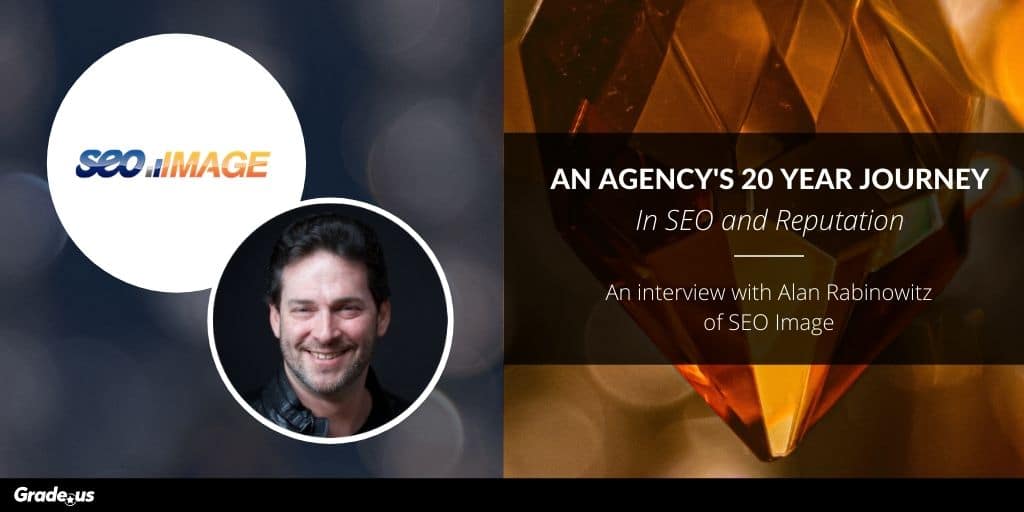Alan Rabinowitz of SEO Image has been offering SEO and reputation management to his clients for over 20 years. He took the time to sit down with me and discuss how SEO has changed, how he educates clients, where reputation comes into play, and some of the strategies his agency uses to help their clients when they start from a negative position.
Check out the interview below:
Garrett: Hi everyone! My name is Garrett Sussman. I’m the head of content at Grade.us. I am here today with Alan Rabinowitz, the CEO of SEO Image, a digital marketing agency. Alan, thank you for joining me today.
Alan: Glad to be here. Thanks for having me.
Garrett: Absolutely. So I’m really curious about your digital marketing and online reputation management services.
But before we get to the nitty gritty, why did you start SEO Image? What’s the company’s mission? How has it evolved over the years as you’ve developed it?
Alan: Well, SEO Image started as a design company years back and was actually called SEO Design. We updated it to SEO Image in 2003.
Our mission was more focused on SEO than design. In 2003, the world of search and marketing and getting an online presence was really focused on organic search. There wasn’t too much out there. Social media sites didn’t have the traffic that they currently have today. They weren’t as used as Google was. Google was still competing with the offline portals, which no longer exist.
So we moved our focus to help clients get an online presence. We branded ourselves as SEO Image, because we were trying to promote a business, a brand, their image, and how they wanted to present themselves. Not only the SEO part of it, but the marketing and the branding.
Garrett: That’s really cool. Reputation was an underlying foundation of the brand from the get-go as well. What specific services did you offer when you first opened and what have you added over the years?
Alan: When we started it was just design and SEO. We were doing more SEO than we were doing design. Then, we started to go into paid search. Then, we started to offer social media services, but we’re not a social media agency or an influencer marketing agency. We moved to the SEO and reputation management markets focused on organic search, which are currently our two core services.
Garrett: Naturally, they go hand in hand. Tell me about reputation management. How do you define it? Because a lot of people understand or misunderstand the common nomenclature around it. So how do you talk about reputation management?
Alan: We see it as a positive impact for your brand. A lot of people hear the words reputation management, they think, “OMG, something’s got to be wrong, we’ve got to put out a fire.” Sometimes, we get clients that are in that situation.
But we also get clients that aren’t in that situation, clients that need that push, because they’re not focusing on how they are presented in search engines when people look for them. Reputation Management is not always putting out fires. Some of our clients want to promote certain things they have done that don’t seem to show up that well, and that’s where we come in.
They’re not representing themselves the way they could be. For instance, say a client is trying to promote that they’re in the medical industry and that they have their own practice. But they also have a not for profit organization that’s a fund or a charity. When you go to Google them, you find them listed as a doctor and hospital, but you can’t find their non-profit organization. Our goal is to help them showcase what they want to have seen.
So reputation for us is not just cleaning up the negatives, it’s also helping build the positive. We help them build the positive. It’s like micro PR. We’re trying to push out our clients and get them seen positively. Including, what they’re currently doing and how that matters. Let’s talk about it, let’s put a press release out, and let’s announce that to the world. That’s what we market. Let’s approach people and say, hey, look at what we’re doing. Your publication has discussed this before, we have something new, do you want to chat about it?
Garrett: You don’t necessarily work with one specific industry. What different industries do your clients come from and how does the reputation management kind of differ depending on the client?
Alan: We have a lot of different types of clients. All different types of industries, doctors, lawyers, jewelers, some of the biggest companies in the world of real estate both residential and commercial. We have some of the largest companies in the world in business performance and outsourcing of business services. All different types of companies going in different directions and doing different things. We don’t just focus on big brands, as we have small mom and pop shops, and individuals as well.
Our job is to help them get an online presence or sometimes clean up a presence or make it more remarkable.
Sometimes we get individuals who have something from the past that they don’t want to showcase. It doesn’t mean it’s terrible, it’s just something they just don’t want out there anymore.
For instance, someone who ran a company 10 years ago, sold it and then it failed after that. Now when people Google them, they’re seeing all this association with the old company and not the progress that they made currently. So our focus becomes promoting the new company and the positive things that the new brand and individual is doing.
We have found ourselves with clients in many different industries. At one point in time, we had four of the largest real estate firms in the world at the same time. So how do you manage that? We were helping all of them. There wasn’t really any conflict, even though the general category is the same, we were doing different types of work for each company. All keywords were different. So it wasn’t even a problem, it was rather fun being able to get these companies on the map!
Garrett: Every business is unique. It’s a big world where they always have slightly different audiences. When a potential client comes to you and they want your reputation management services, how do you initially approach these clients? What is the process that SEO Image goes through when they have interest in your services?
Alan: Typically, when a client comes to us with a negative reputation, we come up with several different strategies immediately.
First off, we look at their negative reviews. How are we going to approach that? Because we’re not going to go out and write a bunch of fake reviews. We design strategies for them by looking at their business.
What are they doing now? What have they been doing?
Are they outreaching to people who wrote a negative review to try to turn it into a positive? You could take a three star review and turn it into a five star review. Or you could take a one star review and turn into a five star review. People don’t realize that there’s different approaches that you can take for different situations, when you’re trying to put out that fire.
The other approach, is what we call in the business, a push down service. Now, I don’t like to call it a push down service, because I am a glass half-full guy. So we rephrased it as: We’re going to repopulate the search results with good positive things that their companies or the individual are currently doing. We’re going to promote the positive image of their brand.
We’ll work with the client to give them many possible solutions. Sometimes it’s just pushing up their social media profiles. Sometimes it’s pushing up profile pages, creating profile pages, adding bios, info pages, things like that. We want to take what’s currently showing in the top of the rankings and outrank the listings that our clients don’t want to be focus items. That’s why a lot of people don’t understand the majority of reputation management is actually SEO. We’re trying to rank for the keyword(s) whether it’s an individual’s name or a brand. That’s SEO.
We’re also creating new content, so that we can populate the news and featured snippets. A lot of people don’t understand that part of Google’s search results contain news, maps, videos, knowledge panels and whatever the search engines feel that the results pages should showcase. There’s a lot going on with schema and rich content. Now we have the knowledge panel. Say the client has a problem with Wikipedia information and it’s pulled into the Knowledge panel, then there’s different types of strategies that we will use to re-showcase them.
Many clients don’t always think about what positive things they could do. They just say “help. I’m in an emergency,” and they’re not in this great state of mind. They’re not happy when they come to you, so we have to try to make them happy.
Sometimes it takes a while because some things in search aren’t going to be fixed overnight. We’re not putting up paid ads for 10 positions. We’re putting up the positive and helping reshaping a reputation organically. So you need to properly explain timelines and expectations. In this industry, you want to be completely honest and upfront. “Hey, it’s not going to take you a month or two months to clean this up, it’s going to take some time, but it can be made positive. We have to refocus your brand or image online, we have to publish your new presence, that can take time.
Sometimes we’ve been able to achieve very quick results for people. We optimize some of their properties and social properties and interlinking and then…Boom! We gave them a positive return on page one in the first few months. But for many this isn’t always the case, it could take a bit longer. I would explain to clients a worst case scenario, which doesn’t always help in the sales, but you know, you’re not always going to bring in that person, when you tell them it could take them six or nine months or longer to clean some items. Some items can simply be very difficult to outrank once, yet we need to outrank it 10 times.
That’s how we look at reputation management.
What is the goal of the client? How can we help them? How do we put out this fire? What can we push out that’s good and positive? What’s a realistic timeline to achieve these results? We want to promote the positive image.
Garrett: You have touched on so many great things.
It’s really interesting to me how much has changed in the last few years with local search and the knowledge panel.
There are a lot of people in our industry, in the SEO industry, that make promises that are unrealistic, firms making promises that just are impossible.
When it comes to the clients you’re working with, how do you go about educating them?
What does that education process look like? You and I, we know this stuff, but for someone who’s not familiar with it, you have to start from the bottom of how search works. What do you do?
Alan: I try not to get too in-depth. I’ve been doing sales calls since 2001. Back then, I used to have to explain what SEO was. People used to call asking me what SEO is and trying to understand it. Back in the early days, we weren’t even building many links. We were just putting out keyword rich content, adjusting titles and meta tags, adding tags – the SEO basics. Links pre-2000 were the best way to get from one website to another. People may remember webrings. WebRings helped people with similar websites send traffic from one site to another. Google just happen to use links to calculate website popularity and PageRank back then, so of course, it changed how marketers used them.
Links still help, however, other ranking factors come into play, “What’s happening on the website? How are people going through your website and getting to that conversion? Are we telling Search Engines where that conversion is? What is the user behavior? What’s the bounce rate look like for a specific keyword?”
That gave us other strategies to try to help market content. I can’t explain all that to them in a nutshell and if I did most people won’t fully understand it. However, we could give them some ideas, “Hey, we’re going to help you create new news. We’re going to repopulate search results with new news. We’re going to push up stuff that exists already. Your LinkedIn profile, it’s number four, but we could get your LinkedIn profile number two, or number three, possibly even number one. What about your website, where is that ranking? We look for items we can help rank faster.”
If we’re helping an individual, or a small firm, we’ll usually be working directly with the owners and the marketing team at the same time. If it’s a huge company, then we’re just working with the marketing team. Some people educate themselves enough after working with us to be able to actually do some of the work and maintain it themselves over time.
Garrett: That’s really interesting too, because I think that some of the most successful relationships are when the client can actually work with you to help themselves succeed.
How long do your projects or your relationships typically last? You and I both know SEO reputation is an ongoing service. It’s not something that ever actually ends. If you have someone with a negative reputation, are they looking at the retainer off the bat? Is it a project based timeline? How do you typically work with your clients?
Alan: We try to be realistic so timelines are suggested. We usually give prospects a couple of different pricing plans for a couple of different potential timelines.
It’s based on workflow and how much work we feel we’re going to have to do. We’ll provide them with some itemized information on what we’re doing, and they can make some decisions based on that. If it’s a large company and you help clean them, they will stick with you for SEO. They usually want to keep some level of maintenance, because they’re not always happy when their negative content is off page one. Then they want page two cleared, then they want page three cleared and so on.
We know that most people don’t go past page one to begin with. It’s a ridiculously small amount that actually goes to page two vs. doing a new search. I forget what the latest data is. But I think at one point I saw the most was only 7% of searches will go to page two.
So with our SEO services, we’ve had clients for over nine years. I have clients that have been with me since the start of the company. We’re talking about like 17 years. People don’t stay with you, if you’re not getting them results and it’s hard to get results, especially now with search engines implementing many new ranking factors based on behavior.
With local search, Google My Business is another area we can optimize and help companies have a better presence.
Garrett: Yeah, there’s so much that you can do.
When it comes to reputation management, tell me a little bit about the day to day responsibilities of you and your project managers . What are you doing during a normal 9-5 that’s helping your clients?
Alan: We’re looking at what’s going on in the results. We’re conducting outreach to a lot of people to get stories written, to get news buzz. We’re reaching out to news portals and reporters. We’re reaching out to our own clients to get them to give us something that they’re doing that we can promote. We’re looking at the content on their website for the terms we are trying to rank.
What can we push out to social media and help drive in backlinks by coming up with some good sharable content for them. We give clients a content strategy. We look at their reviews if there’s a review element, and we come up with a review strategy and help them implement it.
Let’s try to approach someone who wrote a negative review. We’ll help the client try to change that review from one star to five stars. Sometimes we will handle the approach depending on the client. We’re trying to change a review and sometimes the person who wrote it is unhappy. The call needs to come from someone who has thick skin. Someone who’s not taking it personally. Someone who’s trying to get this person who’s probably still angry at them to smile and change their mind.
How do you get the person who’s angry at you not to be angry at you anymore? What can you give to them? What can you do?
Garrett: Is there a specific example that you could actually share? What have some of those experiences been like? Have you been on the phone with one of your client’s angry customers? Was there a specific technique that got them to turn it around and switch it from one to four or five stars?
Alan: We had someone who was a temp for a company. They wrote on Glassdoor, a really bad review. In fact, they had written the negative review in a few different places. They wrote it on Google as well. This employee was only a temporary employee for one week. This person was just having a really bad day when they put up all these bad reviews which our client wasn’t happy with.
We came up with a decision to try and approach this person as the company was a bit unsure why this was done. We basically tried to come up with something that could make them happy, including some temporary work this decision was made before the call. Apparently, they didn’t have anything to do and were out of work. So we spoke with that person, offered them a potential new temp position, despite the fact that they had gone very far with some negative comments. So we helped get that person with a small external freelance project. That helped change those reviews around. Some were completely deleted. Others were changed to four stars.
That person was so angry, we were trying to explain to them, “Look, we’re not the person that you’re angry at. We’re trying to help you. What would it take to make you happy? You were only there for a certain period of time. Your experience shouldn’t reflect negatively on every single person who ever worked for the company. So what can we do to get you to change your mind?”
It was really the owner that was pigeon-holed on getting that review to change. We felt that they should just respond on the portal and say, “Hey, this was a temporary person and they were only here for so long.” But the owner wanted it removed completely. They didn’t want the negative at all. They felt the negative was detrimental to them (and there’s a lot of data that that does say that.) They wanted to have top-talent, so they felt it’s worth the effort.
Garrett: So if someone is doing review management themselves and they receive a negative review, what do you recommend? What’s the best thing that they can do to get the person to change?
Alan: Well, not everyone’s going to be capable of getting the review changed. Sometimes you have other issues, and there may be no way possible to approach certain people. Especially if they’re doing nasty things as part of their strategy. No matter what, they just keep going and going. Anytime a new customer leaves a positive review. They push it, trying to knock it and hammer it down with votes against it and comments. They might have someone constantly attacking them. That’s a very different situation and much harder to manage and sometimes needs a legal side.
For most people, if it’s a simple one time negative review on a product or service, it’s totally approachable. Try to get people to reconsider. For instance, you buy something on a marketplace type of site. You write a bad review and the company reaches out and contacts you. They send you the updated version of their product for free or a replacement version of their product at no cost shipping, everything covered completely. They even refund you your original purchase.
Are you still going to leave a one star review up there? You’re probably going to be much happier now and even change it to four or five stars, noting excellent customer service, and leave it at that.
It’s very common to see this now. There’s one of these very large furniture and home improvement companies that if you got something and you weren’t happy with it, they would refund you completely and you don’t even have to ship the product back. You can keep it. Are you going to negatively review that company? No, as a matter of fact, you’re going to shop from them again. You’ll likely become a lifetime client and actually wind up spending thousands of dollars. They’re paying for you to not only give them a good reputation, but also hoping that you will become a repeat customer.
That’s one of the best ways to handle negative reviews. So I talk to a lot of business owners, and tell them to think about their own experience buying a product and not liking it. Another business makes you happy with their customer service. You should be doing the same exact thing.
I had one client in a health profession where she wasn’t happy with some Google reviews. I suggested that she give someone a free session, and she did. That changed the Google reviews. We went from a three star rating to four stars. She now has an ongoing new client as well and intends to make that four star become five stars.
That’s dramatic, but a lot of people don’t understand the ranking algorithms in Google. You want to stay above a certain level. If you’re above that score, that’s going to help you. I believe 4.0 stars was the default at one point in time. So getting good positive reviews helps where you show up in Google. Having zero reviews can still sometimes rank, but you won’t rank as high as someone who has one positive review. So you should have a strategy in place. Just one positive review can be enough to get a site to perform very well in Google My Business results.
Garrett: Yep. Especially depending on the area. If your geographical location does not have many businesses in your industry, your reviews will differentiate you. I love the way you talked about how it really comes down to customer service. Having a long term view, if you bite the bullet for this one upset customer sometimes, that will benefit your business tenfold.
Alan: Yes, and then people become helpful to you. They actually go out, they start talking about you, and they say positive things about you. Amazon has a whole system that will ask you, “Hey, can you answer this question for someone?” You had the product that got replaced for free by the business. You’re happy with the replacement. So you’re going to go on and say something nice about the product. If you can answer the question, you’re going to.
These little positive interactions are worth so much to companies, and they don’t realize it. They’d rather skimp on a $20 product and postage and ignore the review than address it. Companies wind up paying thousands of dollars in time and services to try to fix their reputations from avoiding that refund. It just doesn’t make any sense. That’s why companies start to look at weighing customer service as part of the cost of doing business. They look at what other companies are handling their customer service. It makes a big difference for them. It’s tremendous what these companies will now do to keep customers happy. Once you make someone happy, they’re going to be happy about you for a long time.
Garrett: If someone did have issues with their reputation, and they were looking for an agency like SEO image to help them, how can they get in touch with you and what’s the best way to reach you?
Alan: Well, they could go to our website and fill out any of the forms on the page or they could call our toll free number on our website at SeoImage.com.
We typically get back to someone within 24 hours and we’re very personal with our clients. We like to give them that attention. We always respond to client emails within 24 hours. Every email no matter what, even on a weekend – I have spent a few hours on numerous weekends and holidays with one or two of my clients. Always happy to show that we will go that extra mile.
I actually gave someone an entire website designed from the ground up. We built up a personal website for someone as part of their campaign and gave it to them and included it in the plan. We wanted the strategy to start off right. We knew this was going to be a potentially short term client. We knew that they didn’t have a budget to continue with month to month, but we wanted them to get results even after we stopped services.
Garrett: That’s great. Obviously you practice what you preach, your clients are very lucky. I really appreciate you taking the time with me today to interview and shine a light on reputation management. Thanks again. I appreciate it.
Alan: No problem. Thanks again for having me.










